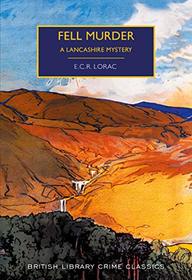A murder mystery in the "classic" style, which resonates much deeper than the relatively simple plot might suggest, because of sensitive handling of time and place.
Full disclosure: for over 25 very happy years of my life, I lived in the Lune Valley, the setting of "Fell Murder." I lived in a village which is probably less than five miles from the "scene of the crime," in a house on a hillside which, if you stood on tiptoe, and leaned over a bit, might have had a view of some of the fields and lanes mentioned. So, I approached the novel with no little trepidation: it can be a dodgy exercise, reading a novel about a place you love, and think you know well. It's a fine line between getting it very wrong, so it feels like the author only did the most cursory research, and getting it too right, so it feels like a Wikipedia article, thinly disguised as a novel. No pressure, then ...
I am delighted to report that the late Edith Caroline Rivett, writing as E.C.R. Lorac, achieved "Goldilocks" status, and got it just right. She obviously knew the hillsides and flood plain of the Lune Valley, and the ways of its farmers, very well, but she wears her knowledge lightly, and works it into absolutely essential scene- and character-setting. In the end, you understand why you have been told something -- it's all very interesting, but it's also all very necessary to constructing the story of the murder of landowner and farmer Robert Garth, and its solution.
I'm not going to argue that this is a "lost masterpiece." This is a novel where, I think, the sum is greater than the parts. Lorac captures a place beautifully, writing almost poetically about the beauty of those hillsides, and that river, and the wonderful vistas you can see from the high points surrounding them. She captures a time, and difficult circumstances so well -- you come away with a real sense of the challenges and fears of ordinary British farming folk as they entered the sixth year of the war against Hitler, and what they had to do to contribute to the victory we know, but they could only hope for. And awareness that their response was, for the most part, to ignore their fears, and get on with rising to the challenges. Admirable ... and humbling.
And yet, Lorac seems to be saying, however admirable it all seems, evil and selfishness can still worm their way in, and it takes someone who understand these people and their circumstances to identify the murderer, and prevent a terrible injustice being done.
This will probably seem very old fashioned, by modern standards, in style, plotting and characterization. But it's as a period piece that I consider it a minor treasure. And I learned that the second growth of grass after the hay has been mown is called "fog grass." Lived there 25 years, and I never knew that ...
Full disclosure: for over 25 very happy years of my life, I lived in the Lune Valley, the setting of "Fell Murder." I lived in a village which is probably less than five miles from the "scene of the crime," in a house on a hillside which, if you stood on tiptoe, and leaned over a bit, might have had a view of some of the fields and lanes mentioned. So, I approached the novel with no little trepidation: it can be a dodgy exercise, reading a novel about a place you love, and think you know well. It's a fine line between getting it very wrong, so it feels like the author only did the most cursory research, and getting it too right, so it feels like a Wikipedia article, thinly disguised as a novel. No pressure, then ...
I am delighted to report that the late Edith Caroline Rivett, writing as E.C.R. Lorac, achieved "Goldilocks" status, and got it just right. She obviously knew the hillsides and flood plain of the Lune Valley, and the ways of its farmers, very well, but she wears her knowledge lightly, and works it into absolutely essential scene- and character-setting. In the end, you understand why you have been told something -- it's all very interesting, but it's also all very necessary to constructing the story of the murder of landowner and farmer Robert Garth, and its solution.
I'm not going to argue that this is a "lost masterpiece." This is a novel where, I think, the sum is greater than the parts. Lorac captures a place beautifully, writing almost poetically about the beauty of those hillsides, and that river, and the wonderful vistas you can see from the high points surrounding them. She captures a time, and difficult circumstances so well -- you come away with a real sense of the challenges and fears of ordinary British farming folk as they entered the sixth year of the war against Hitler, and what they had to do to contribute to the victory we know, but they could only hope for. And awareness that their response was, for the most part, to ignore their fears, and get on with rising to the challenges. Admirable ... and humbling.
And yet, Lorac seems to be saying, however admirable it all seems, evil and selfishness can still worm their way in, and it takes someone who understand these people and their circumstances to identify the murderer, and prevent a terrible injustice being done.
This will probably seem very old fashioned, by modern standards, in style, plotting and characterization. But it's as a period piece that I consider it a minor treasure. And I learned that the second growth of grass after the hay has been mown is called "fog grass." Lived there 25 years, and I never knew that ...




